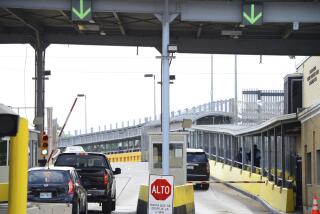Peace talks now
THE UNITED STATES might have liked to wait until September for Army Gen. David H. Petraeus’ report on the results of the troop surge in Iraq, but that wishful timetable has been overtaken by events. President Bush must begin planning a strategic and orderly disengagement that addresses the increasingly unstable geopolitical terrain.
Three developments underscore the urgency of change. First, as Bush’s nominee for war czar, Douglas E. Lute, recently told Congress, the surge has made “very little progress,” and the violence will continue unless there is major political reform. But even the administration concedes that such reform is unlikely soon. Not to attempt a course correction is therefore likely to condemn more U.S. troops to die for what their own government concedes may well be a lost cause. That is profoundly wrong.
Second, Turkey’s increasingly blunt military threats to Kurdistan validate the warnings by the Iraq Study Group and other experts that unless Iraq’s neighbors are brought in to help make and guarantee a peace, they are likely to be spoilers -- if not combatants. The Turkish military claims the right to defend itself against terrorism by the Kurdish Workers’ Party, or PKK, which continues to attack soldiers and civilians in Turkish territory and then retreat to its bases in Iraq. Turkey has massed troops on the border and shelled PKK camps. An incursion into Iraq would be an unmitigated disaster, pitting a NATO ally against the U.S., the Arab world, the Kurds and the Iraqi government. A year ago, retired Gen. Joseph Ralston was tapped as a U.S. special envoy to try to prevent just such an outcome. But the dispute can only be resolved as part of an international diplomatic peace process for Iraq.
The third disturbing revelation is that the U.S. has been funding and arming former Sunni insurgents who are fighting Al Qaeda in Al Anbar province -- even as the vaunted anti-Al Qaeda coalition there is shattering. The enemy of our enemy may not be our friend even until autumn. U.S. officials concede that arming the Sunni fighters is a risky move; the weapons could next be turned against Shiites, Kurds or Americans. That they judged this risk worth taking reveals how poor are the other U.S. military options.
It would be naive to believe that all Iraqis can be reconciled, but Al Qaeda cannot likely be contained until the other parties stop fighting. Our interest lies in putting Iraqi security into Iraqi hands and brokering a political reconciliation.
The U.S. should ask the United Nations to sponsor an international peace process along the lines of the Bonn conference that formed a post-Taliban government for Afghanistan. It must enlist Iraq’s neighbors -- which fear chaos when the U.S. leaves -- and try to broker a cease-fire among the splintered and balkanized Iraqi players. Diplomatic failure is always a possibility, but a purely military solution is impossible. And waiting until September to act is the riskiest course of all.
More to Read
Start your day right
Sign up for Essential California for news, features and recommendations from the L.A. Times and beyond in your inbox six days a week.
You may occasionally receive promotional content from the Los Angeles Times.






